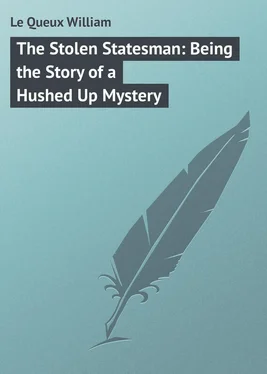William Le Queux - The Stolen Statesman - Being the Story of a Hushed Up Mystery
Здесь есть возможность читать онлайн «William Le Queux - The Stolen Statesman - Being the Story of a Hushed Up Mystery» — ознакомительный отрывок электронной книги совершенно бесплатно, а после прочтения отрывка купить полную версию. В некоторых случаях можно слушать аудио, скачать через торрент в формате fb2 и присутствует краткое содержание. Жанр: Классический детектив, foreign_detective, foreign_prose, на английском языке. Описание произведения, (предисловие) а так же отзывы посетителей доступны на портале библиотеки ЛибКат.
- Название:The Stolen Statesman: Being the Story of a Hushed Up Mystery
- Автор:
- Жанр:
- Год:неизвестен
- ISBN:нет данных
- Рейтинг книги:3 / 5. Голосов: 1
-
Избранное:Добавить в избранное
- Отзывы:
-
Ваша оценка:
- 60
- 1
- 2
- 3
- 4
- 5
The Stolen Statesman: Being the Story of a Hushed Up Mystery: краткое содержание, описание и аннотация
Предлагаем к чтению аннотацию, описание, краткое содержание или предисловие (зависит от того, что написал сам автор книги «The Stolen Statesman: Being the Story of a Hushed Up Mystery»). Если вы не нашли необходимую информацию о книге — напишите в комментариях, мы постараемся отыскать её.
The Stolen Statesman: Being the Story of a Hushed Up Mystery — читать онлайн ознакомительный отрывок
Ниже представлен текст книги, разбитый по страницам. Система сохранения места последней прочитанной страницы, позволяет с удобством читать онлайн бесплатно книгу «The Stolen Statesman: Being the Story of a Hushed Up Mystery», без необходимости каждый раз заново искать на чём Вы остановились. Поставьте закладку, и сможете в любой момент перейти на страницу, на которой закончили чтение.
Интервал:
Закладка:
The keen-eyed detective listened attentively to her recital.
“Can you recall any occasion on which he failed to notify you?” he asked when she had finished.
“No,” she answered firmly. Then she recollected. “Stay! There was one occasion. He was walking home from the House on a foggy night, and was knocked down by a taxi, and slightly injured. They took him to a hospital, and I was telephoned from there, and went to him.”
A gleam of hope shone in Austin’s eyes.
“We never thought of that.”
The great detective shook his head.
“But we thought of it, Mr Wingate. My friend here has had every hospital in the radius rung up. No solution there.”
There was silence for a long time. It seemed that the last hope had vanished. Smeaton stood for a long time lost in thought. Then he roused himself from his reverie.
“It’s no use blinking the fact that we are confronted with a more than usually difficult case,” he said, at length. “Still, it is our business to solve problems, and we shall put our keenest wits to work. I wish it were possible, for Miss Monkton’s sake, to keep it from the Press.”
“But would that be impossible?” cried Wingate.
“I fear so. If a little servant-maid disappears from her native village, the newspaper-men get hold of it in twenty-four hours. Here, instead of an obscure little domestic, you have a man, popular, well-known to half the population of England, whose portrait has been in every illustrated paper in the three Kingdoms. I fear it would be impossible. But I will do my best. The Home Secretary may give certain instructions in this case.”
Then turning to Sheila he said:
“Good-night, Miss Monkton. Rely upon it, we will leave no stone unturned to find your father, and bring him back to you.”
He was gone with those comforting words. But with his departure, hope seemed to die away, and Sheila was left to confront the misery of the present.
The faithful Grant, who had been hovering in the background, came forward, and spoke to her in the coaxing tone he had used when she was a child.
“Now, Miss Sheila, you must go and rest.”
“Oh, no!” she cried wildly. “What is the use of resting? I could not sleep. I can never rest until father comes back to me.” She broke into a low wail of despair.
Grant looked at Wingate, with a glance that implored him to use his influence. The faithful old man feared for her reason.
“Sheila, Grant is right,” said Austin gravely. “You must rest, even if you cannot sleep. You will need all your strength for to-morrow, perhaps for many days yet, before we get to the heart of this mystery. Let the servants go back to bed. Grant and I will wait through the night, in case good news may come to us.”
There were times when, as the old butler remembered, she had been a very wilful Sheila, but she showed no signs of wilfulness now. The grave tones and words of Austin moved her to obedience.
“I will do as you tell me,” she said in a hushed and broken voice. “I will go and rest – not to sleep, till I have news of my darling father.”
Through the weary hours of the night, the two men watched and dozed by turns, waiting in the vain hope of word or sign of Reginald Monkton.
None came, and in the early morning Sheila stole down and joined them. Her bearing was more composed, and she had washed away the traces of her tears.
“I intend to be very brave,” she told them. “I have roused the maids, and I am going to give you breakfast directly, after your long vigil.”
Impulsively she stretched out a hand to each, the youthful lover and the aged servitor. “You are both dear, good friends, and my father will thank you for your care when he comes back to me.”
Moved by a common impulse the two men, the young and the old, bent and imprinted a reverent kiss on the slender hands she extended to them.
It was a moment of exquisite pathos, the fair, slim girl, resplendent yesterday in the full promise of her youth and beauty; to-day stricken with grief and consumed with the direst forebodings of the fate of a beloved father.
Chapter Four.
The Man who Knew
Three days had gone by, and the mystery of Reginald Monkton’s disappearance remained as insoluble as ever. Well, it might be so, since there did not seem a single clue, with the exception of the name muttered by the dying man, which at first had sounded like Molyneux, and afterwards like Mulliner. Neither Sheila nor Grant, who had listened to those faint sounds issuing from the dying lips, could be certain which of the two was correct.
Wingate had seen Smeaton twice, and that astute person assured him that the keenest brains at Scotland Yard were working on the case. But he was very reticent, and from his manner the young man was forced to draw the conclusion that the prospects of success were very slight.
If it had been simply a case of disappearance, uncomplicated by other circumstances, many theories could have been formed. There were plenty of instances of men whose reason had become temporarily unhinged, and who had lost consciousness of their own identity.
Again, men have disappeared voluntarily because they have been threatened with exposure of some shameful secret of the past, and will willingly pay the penalty of separation from their own kith and kin to avoid it.
But no such theories seemed tenable in this instance. Monkton’s life, in the opinion of all who knew him, had been a well-ordered and blameless one. He had been a devoted husband; and he was a devoted father, wrapped up in his charming daughter, the sole legacy of that happy marriage.
In the case of such a man, with so stainless a record, it was unthinkable that anything could leap to light from the past which could shame him to such an extent that he would, of his own act, abandon his office, and isolate himself from his child.
Even granting such an hypothesis for a moment, and brushing aside all the evidences of his past life and all the knowledge of him gained through years by his relatives and intimate friends, how did such a theory fit in with the appearance on the scene of the stranger now dead?
“You fear the worst?” queried Wingate one day, as Smeaton sat with him in his cosy rooms in Half Moon Street.
“It is too early yet to give a decided opinion, if, in a case of such complexity, one could ever give a decided opinion at all,” was the detective’s answer. “But at present things point that way. What was the motive underlying the scheme? You can give the answer quickly – that all inquiries as to the real man are being stifled.”
“In other words, that Mr Monkton has been done away with, for motives we do not know, by the person or persons who put the man into the taxi?”
Smeaton nodded. “That’s what it seems to be at the moment, Mr Wingate. But we should be poor detectives if we pinned ourselves to any one theory, especially on such evidence – or rather want of evidence – as we have got at present. Cases as mysterious as this – and there was never one more mysterious – have been solved by unexpected means. If we can get hold of that driver who brought the dying man to Chesterfield Street, we may light upon something useful.”
“If he was an accomplice, as seems possible, he will never turn up,” said Wingate gloomily.
“Accomplice or not, I think the reward will tempt him,” replied Smeaton, “even if he has to make up his tale before he comes. I expected he would come forward before now. But one of two things may have happened. Either he may be cogitating over what he shall say when he does come, or he may be an ignorant sort of fellow, who hardly ever reads the newspapers.”
“Anyway,” resumed Smeaton, after a thoughtful pause, “if and when he does turn up, we shall know, with our long experience, what sort of a customer he is. You may rely upon it that if there is anything to be got out of him, we shall get it, whether it proves valuable or not.”
Читать дальшеИнтервал:
Закладка:
Похожие книги на «The Stolen Statesman: Being the Story of a Hushed Up Mystery»
Представляем Вашему вниманию похожие книги на «The Stolen Statesman: Being the Story of a Hushed Up Mystery» списком для выбора. Мы отобрали схожую по названию и смыслу литературу в надежде предоставить читателям больше вариантов отыскать новые, интересные, ещё непрочитанные произведения.
Обсуждение, отзывы о книге «The Stolen Statesman: Being the Story of a Hushed Up Mystery» и просто собственные мнения читателей. Оставьте ваши комментарии, напишите, что Вы думаете о произведении, его смысле или главных героях. Укажите что конкретно понравилось, а что нет, и почему Вы так считаете.












